Zondervan Ethics and Apologetics Collection (6 vols.)
Digital Logos Edition
Overview
How do we know Jesus really existed? What is the role of the Christian in regards to bioethics? Should Christians be involved in politics? The Zondervan Ethics and Apologetics Collection (6 vols.) presents 2,000 pages on these oft-debated topics. With contributors from various fields of scholarship, this collection seeks to grasp what the Word of God has to say about key ethical issues and what extra-biblical evidence exists to defend Christianity’s claims about the life of Jesus.
The Zondervan Ethics and Apologetics Collection analyzes the theory of ethics, as well as current ethical issues in regards to sexuality, medicine, religion, politics, and more, and discusses the involvement Christians should have in these areas of life. This collection also addresses key apologetic issues. In The Christ Files, the author uses historical methods to examine Christianity’s claims about Jesus in light of extra-biblical, ancient sources to determine if these claims are true. Two additional volumes emphasize the importance of faith when it comes to searching for specific answers to ethical and apologetic issues.
Please note that this collection is available as part of the Zondervan Bible Reference Bundle 3 (63 vols.).
- Christian perspectives on key ethical issues
- Discussions on the role Christians should have in politics and bioethics
- Examinations of Christianity's claims about the life of Jesus
- Studies on the importance of faith
- Title: Zondervan Ethics and Apologetics Collection
- Publisher: Zondervan
- Volumes: 6
- Pages: 2,000
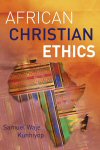
African Christian Ethics is required reading for anyone seeking an overview of burning ethical issues in Africa and practical suggestion on how to address them. The book is divided into two parts. The first part deals with the theory of ethics, while the second discusses practical issues. The issues are grouped into the following six sections:
- Socio-Political Issues
- Financial Issues
- Marriage Issues
- Sexual Issues
- Medical Issues
- Religious Issues
Each section begins with a brief general introduction, followed by the chapters dealing with specific issues in that area. Each chapter begins with an introduction, discusses traditional African thinking on the issue, presents an analysis of relevant biblical material, and concludes with some recommendations. There are questions at the end of each chapter for discussion or personal reflection, often asking students to reflect on how the discussion in the chapter applies to their ministry situation.
Dr. Kunhiyop combines a broad knowledge of African and Western moral traditions with sound biblical scholarship and critical analysis. He thus writes with deep conviction, moral confidence, and authority.
—Yusufu Turaki, Professor of Theology and Social Ethics, Jos ECWA Theological Seminary (JETS), Nigeria
Samuel Waje Kunhiyop is Head of the Postgraduate School, South African Theological Seminary. He was previously the Provost and Professor of Theology and Ethics at Jos ECWA Theological Seminary (JETS). He holds a BA (JETS), MAET (Western Seminary, Portland, Oregon), and PhD (Trinity International University, Illinois). He is also an ordained minister with the Evangelical Church of West Africa (ECWA).
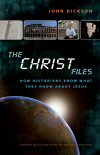
Uniquely among the world’s religions, the central claims of Christianity concern not just timeless spiritual truths, but tangible historical events. At the heart of the of the Christian faith are things that are meant to have happened in Palestine between 5 BC and AD 30. It’s as if Christianity happily places its head on the chopping block of public scrutiny and invites anyone who wants to come and take a swing. Some of Christianity’s claims are so spectacular that they provoke a firestorm of questions, scrutiny, debate, and misinformation whenever they are discussed.
The popularity of The Da Vinci Code and the frequent airing of TV documentaries delving into the darker uncertainties of Christianity show that such skepticism flourishes in the Western world today. In The Christ Files you will learn how historians know what they know about Jesus. Historian John Dickson embraces the need to examine Christianity’s claims in the light of history, opening readers to a wealth of ancient sources and explaining how mainstream scholars—whether or not they claim Christian faith personally—reach their conclusions.
Christianity arrived on the historical scene at a time of great literary activity. While many texts penned by ancient philosophers, historians, poets, and playwrights can reliably inform us about Jesus himself and about the culture in which he lived, others are not so credible. Dickson skillfully highlights both types of sources along with the historical methods used to study Christianity’s claims. He also shows how historians assess the reliability of available data, and provides an honest but informed perspective on where historical issues are clear-cut and where personal faith comes into play. The Christ Files is a must-read for those looking to expand their understanding of early Christianity and the life of Jesus.
The Christ Files offers a wealth of knowledge of the key issues and interviews with key scholars answering key controversial questions about Jesus: Gnostics, the first century Judaism of Jesus, how oral tradition operated in the background, and archaeology. John Dickson is a skilled guide. These “files” are loaded with information that is fascinating and accessible. Open the drawer and enjoy.
—Darrell Bock, Research Professor of New Testament Studies, Dallas Theological Seminary
In a world of many books about the historical Jesus, there are very few which summarize the historical evidence, Greco-Roman, Jewish, and Christian, as well and as succinctly as John Dickson does in The Christ Files. . . . In an increasingly less Christian world, here is some first rate historical detective work that provides effective presentation without apologizing for the New Testament evidence. Highly recommended.
—Ben Witherington III, Amos Professor of New Testament for Doctoral Studies, Asbury Theological Seminary
This attractive book is concerned not so much to tell us what can be known about the life of Jesus as rather to help people who want to know how to evaluate by strictly historical methods the conclusions set forth by contemporary writers who present bizarre reconstructions of him and to see how professional ancient historians give us a firm basis for accepting the New Testament documents as reliable sources for what he did and taught. This is a sober, well-informed guide based on sound scholarship.
—I. Howard Marshall, Professor Emeritus of New Testament, University of Aberdeen
John Dickson . . . has demonstrated his ability to write both at the most sophisticated technical level for fellow New Testament professionals and for the average-level reader with little knowledge of the Bible—and for people virtually anywhere in between. This slim volume aims . . . to correct popular misconceptions about what historians do and don't know . . . But don't be misled by the book's simplicity and clarity; it is based on wide-ranging knowledge of the field and on the finest and most cutting-edge scholarship.
—Craig L. Blomberg, Distinguished Professor of New Testament, Denver Seminary
There is a huge need for intelligent scholarship to be effectively communicated beyond the academy, a role that Dickson fulfills brilliantly. Informed by scholarship, yet highly readable on a nontechnical level, this work is a very useful introduction to historical discussion about Jesus.
—Craig Keener, Professor of New Testament, Palmer Seminary of Eastern University
Confusion about the historical Jesus is epidemic today. Here John Dickson clears the fog and explains with scholarly acumen and compelling arguments precisely how we know what we know about Jesus. In one stroke, he combines first rate scholarship with a clarity found among only the best teachers. This is the book I'll recommend to my students for years to come.
—Gary M. Burge, Professor of New Testament, Wheaton College & Graduate School
Finally, an honest response to sensationalized stories about the life of Jesus. Dickson addresses with refreshing directness the real questions about Jesus’ life and death and examines a sweeping collection of sources in providing full and fair answers.
—Lynn Cohick, Associate Professor of New Testament, Wheaton College and Graduate School
There are many excellent books on the historical Jesus, but few written with the same clarity and balance as John Dickson's The Christ Files. . . . Dickson writes like a journalist, gently guiding readers through the maze of essential questions in the search for the real Jesus. Skeptic and believer alike will find Dickson's approach and cautious conclusions a breath of fresh air in a debate too often characterized by sensationalistic, headline-catching claims on the one side and fundamentalist naivety on the other.
—Mark L. Strauss, Professor of New Testament, Bethel Seminary
John Dickson (PhD, Macquarie University, Sydney) is Senior Research Fellow of the Department of Ancient History, Macquarie University; Co-director of the Centre for Public Christianity; and Senior Minister at St. Andrew’s Roseville. The author of more than a dozen books, he is the host of two major historical documentaries for Australian television and is a busy public speaker in corporations, universities, churches, and conferences.
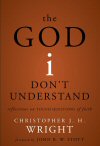
If we are honest, we have to admit that there are many things we don’t understand about God. We do not have final answers to the deep problems of life, and those who say they do are probably living in some degree of delusion. There are areas of mystery in our Christian faith that lie beyond the keenest scholarship or even the most profound spiritual exercises. For many people, these problems raise so many questions and uncertainties that faith itself becomes a struggle, and the very person and character of God are called into question.
Chris Wright encourages us to face up to the limitations of our understanding and to acknowledge the pain and grief they can often cause. But at the same time, he wants us to be able to say, like the psalmist in Psalm 73: “But that’s all right. God is ultimately in charge and I can trust him to put things right. Meanwhile, I will stay near to my God, make him my refuge, and go on telling of his deeds.”
It is because Dr. Wright confronts biblical problems with a combination of honesty and humility that I warmly commend this book.
—John R. W. Stott, Rector Emeritus, All Souls Church
Christopher J. H. Wright is International Director of the Langham Partnership International. He also serves as Chair of the Lausanne Movement’s Theology Working Group and Chair of the Theological Resource Panel of TEAR Fund, a leading Christian relief and development charity. He has written several books, including Living as the People of God, God’s People in God’s Land, Knowing Jesus through the Old Testament, Walking in the Ways of the Lord, Deuteronomy in the New International Biblical Commentary, The Message of Ezekiel in the Bible Speaks Today series, Old Testament Ethics for the People of God, The Mission of God, and The God I Don’t Understand.
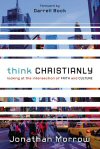
Think Christianly is about seizing the opportunities we have every day to speak the life Jesus offers into our culture. Tragically, many such opportunities pass us by unclaimed—either because we don’t notice them or we have not prepared ourselves to enter into them. And those around us seem to grow increasingly unwilling to hear anything the church has to say.
Jonathan Morrow helps church leaders envision and implement ways for their congregations to “think Christianly” about contemporary questions and to speak in informed, engaging ways. Morrow explores many of the important issues that Christians often hear raised with regard to faith—questions about who Jesus was, the good and bad of religion, pain and evil in the world, the reliability of the Bible, sexuality and intimate relationships, and hope for change, among others. The life and faith issues that Think Christianly addresses lead to cultural moments where Christianity and contemporary culture intersect. This book will help churches take vital steps toward cultivating compassion and competence in speaking faithfully to a questioning world.
As someone who has devoted many years of ministry to teaching Christian worldview, I am thrilled to see dynamic and faithful worldview leaders like Jonathan Morrow stepping to the fore. Think Christianly, in a compelling and accessible way, equips Christians young and old to engage the culture winsomely, intelligently, and confidently.
—Chuck Colson, Founder, Colson Center for Christian Worldview
Jonathan Morrow is the author of Welcome to College: A Christ-follower’s Guide for the Journey and co-wrote (with Sean McDowell) Is God Just a Human Invention? He graduated with a MDiv and an MA from Talbot School of Theology and serves as the equipping pastor at Fellowship Bible Church in Murfreesboro, TN.
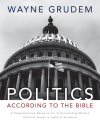
A variety of perspectives exist within the Christian community when it comes to political issues and political involvement. This comprehensive and readable book presents a political philosophy from the perspective that the Gospel pertains to all of life so Christians should be involved in political issues. In brief, this is an analysis of conservative and liberal plans to do good for the nation, evaluated in light of the Bible and common sense. In this ground-breaking book, recognized evangelical Bible professor Wayne Grudem rejects five mistaken views about Christian influence on politics:
- "Compel religion"
- "Exclude religion"
- "All government is demonic"
- "Do evangel-ism, not politics"
- "Do politics, not evangelism"
He proposes a better alternative: “significant Christian influence on government.” Then he explains the Bible’s teachings about the purpose of civil government and the characteristics of good or bad government. Does the Bible support some form of democracy? Should judges and the courts hold the ultimate power in a nation? With respect to specific political issues, Grudem argues that most people’s political views depend on deep-seated assumptions about several basic moral and even theological questions, such as whether God exists, whether absolute moral standards can be known, whether there is good and evil in each person’s heart, whether people should be accountable for their good and bad choices, whether property should belong to individuals or to society, and whether the purpose of the earth’s resources is to bring benefit to mankind.
After addressing these foundational questions, Grudem provides a thoughtful, carefully-reasoned analysis of over fifty specific issues dealing with the protection of life, marriage, the family and children, economic issues and taxation, the environment, national defense, relationships to other nations, freedom of speech and religion, quotas, and special interests. He makes frequent application to the current policies of the Democratic and Republican parties in the United States, but the principles discussed here are relevant for any nation.
A wonderful resource as we face growing tensions from an ever more powerful state.
—Chuck Colson, Founder, Colson Center for Christian Worldview
Grudem's biblically-based good sense overwhelms the nostrums of . . . evangelical left.
—Marvin Olasky, Editor-in-chief, World
Precisely and exactly the call the rising generation needs to hear.
—Timothy Goeglein, Vice President, External Relations, Focus on the Family
Wayne Grudem is Research Professor of Theology and Biblical Studies at Phoenix Seminary in Phoenix, Arizona. He holds degrees from Harvard (AB), Westminster Theological Seminary (MDiv, DD), and Cambridge (PhD). He is the author of more than a dozen books including the bestselling Systematic Theology.
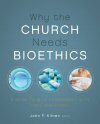
In a world where incredible medical technologies are possible does “can do” mean “should do”? Why the Church Needs Bioethics helps you understand and constructively engage bioethical challenges with the resources of Christian wisdom and ministry. Three rich and true-to-life case studies illustrate the urgency of such bioethical issues as reproductive and genetic technologies, abortion, forgoing treatment, assisted suicide, stem cell research, and human enhancement technologies. Leading Christian voices bring biblical and theological perspective to bear on the incredible medical technologies available today; mobilize useful insights from health care, law, and business; and demonstrate the powerful ways the church can make a difference through counseling, pastoral care, intercultural ministry, preaching, and education.
This book equips students, church and lay leaders, and people in health-related fields with the knowledge to make faithful bioethical decisions and to help foster a world where human beings are shown respect as people created in the image of God. Contributors to Why the Church Needs Bioethics include leading Bible and theology scholars, such as D. A. Carson and Kevin Vanhoozer; leaders in the areas of preaching (Greg Scharf) and ethics (Scott Rae); and fifteen other experts in the fields of biblical-theological studies, ministry, communication, business, law, healthcare, and bioethics.
John F. Kilner (PhD, Harvard) is Franklin Forman Chair of Ethics, Professor of Bioethics and Contemporary Culture, and Director of Bioethics Programs at Trinity International University in Deerfield, Illinois. The author or editor of twenty books, Dr. Kilner served as President and CEO of The Center for Bioethics and Human Dignity in Bannockburn, Illinois from 1994–2005.